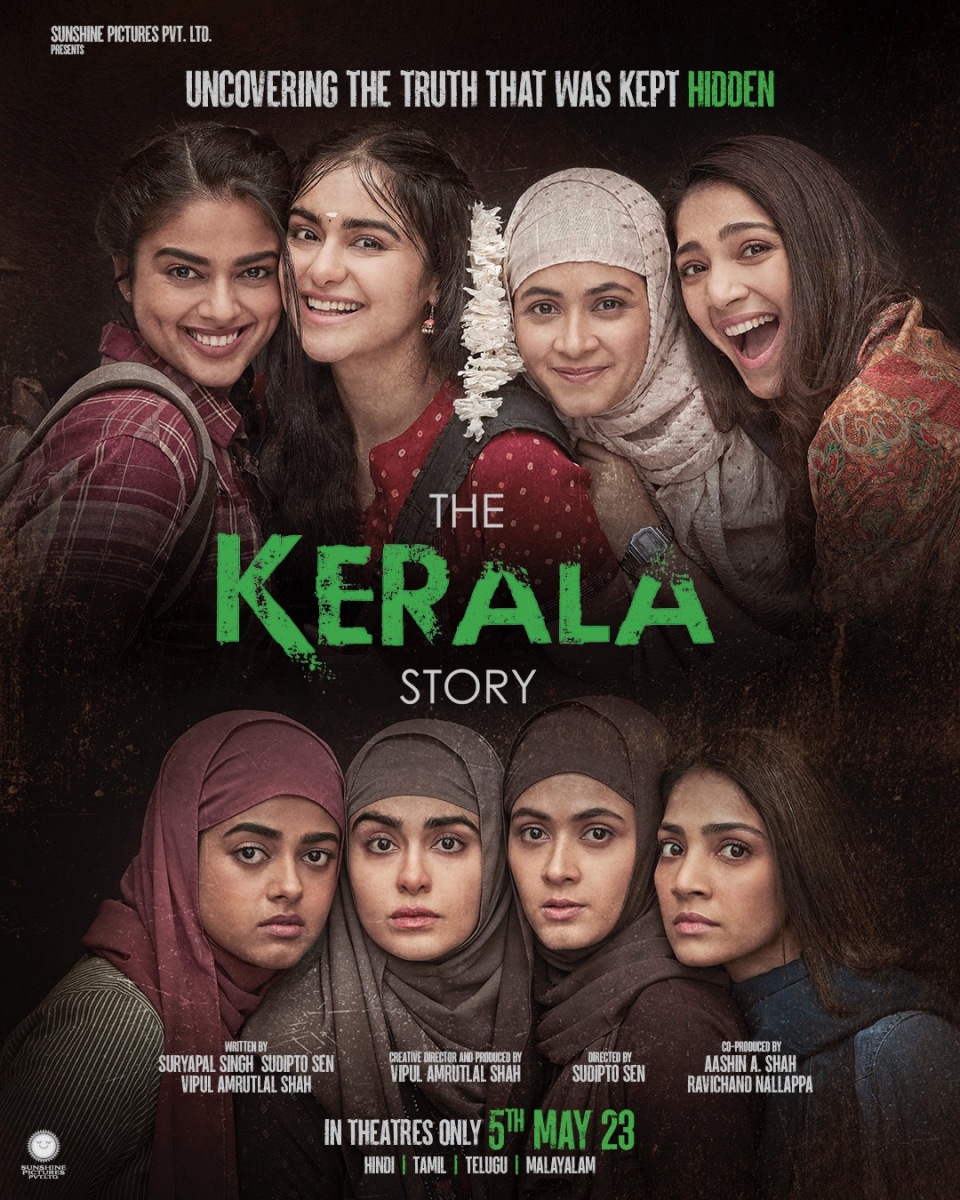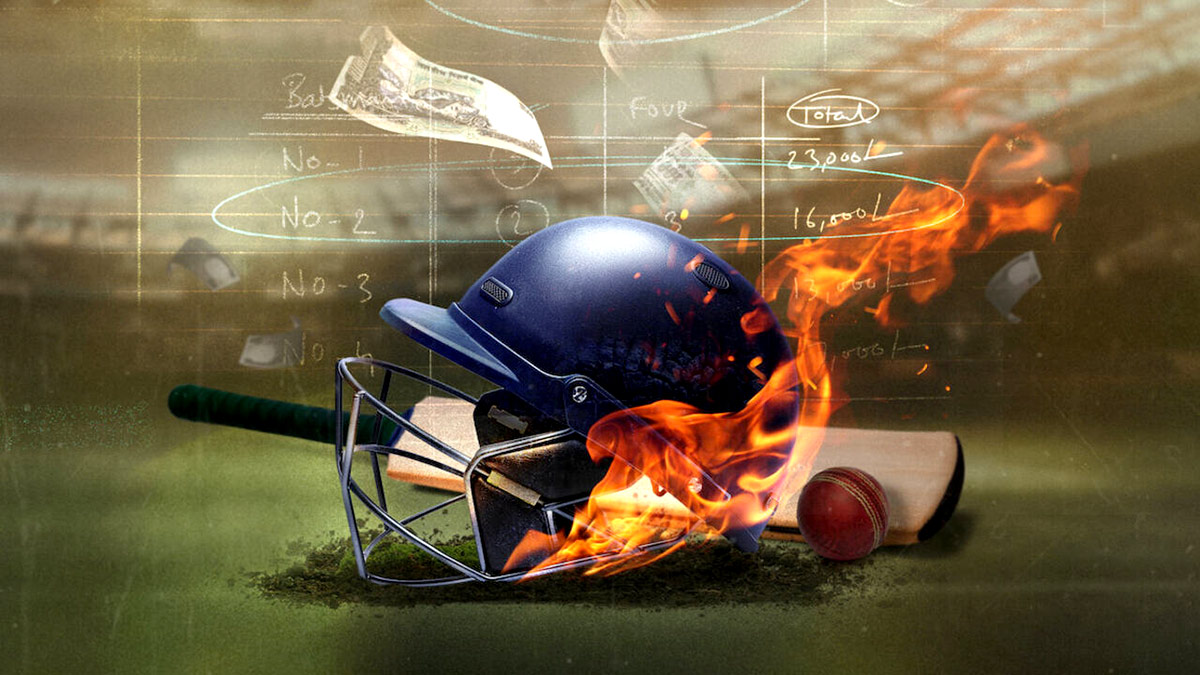Writer, director Sudipto Sen’s film harps on alleged religious conversions, radicalization in Kerala but it’s unlikely to find much takers in God’s Own Country. The chilling, insensitive representation though might trigger a nationwide debate. Adah Sharma makes a sincere effort in portraying an oppressed character.

Rating: 2 / 5
Friday, the fifth. It’s going to be a day for the Left, a day for the Right. Anubhav Sinha-produced Afwaah [2023] takes on the Right, while unheralded filmmaker Sudipto Sen’s The Kerala Story hopes to expose the ignorance of the Left in God’s own country – Kerala.
In a polarized world, it is agonizing to be neutral. “Stop sitting on the fence,” both the Left and the Right will shout. Honestly, objectivity doesn’t align with any ideology. Borrowing Pankaj Kapur’s pertinent line in Lost [2013], we say the moment violence creeps in, it is no longer an ideology.
The oppression in The Kerala Story is violence of the worst kind. That it is done in the garb of religion is all the more condemnable. We say terror has no religion, then why do some commit barbaric acts in the name of God? The woke liberals will never understand the pain until they become victims of such terror. Those who cry intolerance, surprisingly keep mum on terror. It’s selective activism that is more threatening to a nation.
It’s a unique scenario where a Bengali filmmaker is telling about the grave alleged Islamic radicalization and [consensual or coerced] religious conversions in Kerala. Communism is no longer a great force in Bengal, but it is still a factor in Kerala. Despite their Communist history why is a certain faith attracting attention for alleged radicalization?
The Kerala Story is based on tragic true stories of alleged conversions, radicalization of youth, in particularly women from Hindu and Christian communities. Banning it would reflect poorly on those who cry religious intolerance in India. It was natural for the Pinarayi Vijayan-led Left Democratic Front government in Kerala to agitate against the Hindi film. Leave aside the Kerala Story, but are Hindi films a priority in Kerala? What then has upset the LDF, and the Left-liberals in Kerala?
The answer here would be the perceived silence on part of the state to be open about the alleged atrocities, radicalization. Sudipto Sen’s film questions that ignorance. The Kerala police needn’t worry as they are not the devil in this piece. They are simply hampered by the system that can’t act if there is consensual conversion, nikah (marriage] among inter-faith couples.

Sitting in Mumbai, checking through the internet will never give a sense of the ground realties. It is the people of Kerala who know their truth. If we go by the Census [2011], the religious demographics of Kerala has the Muslim population standing at over 88 lakh, which constitutes 26.56 % of the state population. The Christian population stands at 61 lakhs, that is about 18.4 % of the population. The Muslim population has dipped slightly vis-à-vis 2001 where the growth rate stood at 15.84 %. That growth rate was 12.84 % in 2011. The stats reveal the Muslim population to be rising swiftly since 1951 where the growth rate was in 20 percentiles. 1971 saw a 37.49 % increase in the Muslim population. In contrast, the Hindu population has been on the decline. From being 68.5 % in 1901, that rate has now come down to 54.9 %. The Hindu population only grew by 2 %, as pert the 2011 Census.
The Christian population grew steadily from 1911 to 1941. The growth has decreased since 1981. Now, as a rank outsider, what do we attribute this dip in population rate of Hindus and Christians, and the increase in the Muslim population? Well, once they are published, the 2011-2021 Census is likely to show a clearer picture.
Domestic politics will see the Left/Secular versus the Right war of words. However, the conversion culture in Kerala has even got Western powers curious. Sudipto Sen’s controversial film braves to express concerns of radical Islam and forced conversions in Kerala. Though not specified, but Sen’s film inadvertently questions the dangerous, now banned outfit Student Islamic Movement of India. It’s widely speculated that the PFI [Popular Front of India] has become a SIMI variant. Sen ditches diplomacy and braves to point the alleged root cause – religious fundamentalism.
Based on true stories, Sen’s film tells the tale of three young collegians – Shalini Unnikrishnan [Adah Sharma], Nimah [Yogita Bihani] and Geetanjali [Siddhi Idnani] who end up as victims of radical Islam. For any radical conversion, a person must first lose faith in his/her faith. That is largely done by fellow student Asifa [Sonia Balani] who corrupts the minds of Shalini and Geetanjali. However, the lack of respect, understanding of one’s own faith also contributes to the switch.
Nimah, is a devout Catholic and doesn’t waver in her faith. The poor lady though falls prey to the lusty eyes of the devil.
Far too long have sane souls thrown diplomacy to tackle serious issues. Diplomacy breeds a brush-under-the-carpet culture. Sudipto Sen, producer Vipul Amrutlal Shah are very brave in tackling certain religious fundamentalism. The Kerala Story has a story, but it lacks the art of storytelling.
The average screenplay by Suryapal Singh, Sen and Shah reeks of insensitivity in dealing with the subject. We never label any piece of art as propaganda, Sudipto Sen, however, lacks the maturity, sensitivity to bring these contentious social issues on celluloid. While the rigid minority may not be amused, but The Kerala Story could also upset staunch believers of Hindutva. Poor Aamir Khan has the paid the price for the creative liberties in pk [2014].
You want to believe the stories of Shalini, Geetanjali and Nimah, but the insensitive screenplay, narrative is not the answer. Chuck the Left or Right, but such dark truth ought to come out in an objective way. While domestic politics leads to Left vs Right vs Secular debate, world cinema has already shown the way to addressing radicalization on the screen. Caliphate, the Swedish/Arabic series on Netflix has been a shining example here. The first victims of radicalization, terror are Muslims themselves. Syria, Afghanistan, Iraq has borne the brunt for many years.
The shabby screenplay is likely to raise a Left vs Right storm in India. Those opposing the film will be accused of going soft on terror. This allegation was perhaps justified under the UPA regime where terror could easily percolate in different parts of India.
The screenplay, direction is disappointing but Adah Sharma, Yogita Bihani, and Siddhi Idnani put up a respectable show. Maybe, the dreaded stories made us empathetic to their plight. Even after crossing the borders, Shalini, now Fatima, doesn’t quite strike you as an indoctrinated soul. The harsh realities of the Afghan borders made Shalini realise quickly that this is not the heaven that she was promised by her husband Ishak [Vijay Krishna]. Shalini was cheated by Rameez [Pranay Pachauri] who left her pregnant and disappeared. She only married Ishak out of the fear of being shamed for her pregnancy.
Though a Hindi film, the makers haven’t lost sight of the Malayalee roots. Sen has incorporated little bit of Malayalee sentences in certain scenes. There’s even the odd Malayalam song playing in the backdrop. Adah Sharma has the natural Southern accent that made her apt for this role. It’s a brave call by Adah to take up this film. Having largely struggled in Bollywood. The Kerala Story will always be a double-edged sword for Sharma. Chuck the box office, but Sharma has never made such headlines before. Only time will tell whether this is a career-defining or a career-crushing role!
Even for a neutral, The Kerala Story is hard to buy into. However, leave aside any faith, and you’ll be stone cold if you don’t lend an ear to these oppressed women. The Kerala Story is perhaps eyeing attention ala The Kashmir Files [2022]. Despite its few flaws, the latter succeeded as it dealt with a widely open issue. The Kerala Story might shock many. This representation though will only add to the polarization.


![A fan compares Ayesha Singh aka Sai with Kareena Kapoor Khan’s Geet and it’ll break your heart [Watch Video]](https://st1.bollywoodlife.com/wp-content/uploads/2023/02/Ghum-Hai-Kisikey-Pyaar-Meiin-1-600x315.png)










